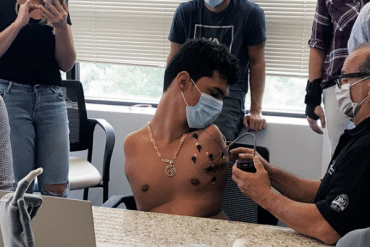Author, speaker and advocate Elizabeth Smart shares her story with A Safe Place.
Elizabeth Smart serves a beacon of hope for countless people. After enduring unimaginable trauma as a child—having been kidnapped at the age of fourteen and held captive for nine months—Smart has reclaimed her life, emerging as a bestselling author, speaker and advocate for survivors. Her most recent book, Where There’s Hope, provides a powerful examination of overcoming trauma and moving forward with strength. On July 7th, Smart will be sharing her story and insights at a free speaking engagement held on Nantucket by A Safe Place.
 Of the island’s many nonprofits, A Safe Place provides truly life-saving services for victims of abuse. From court advocacy, to case management, to supervised visitations, to trauma therapy, to accompanying victims to the police station or hospital, A Safe Place’s services are free and entirely confidential. They’ve also never been more necessary. During the pandemic, the nonprofit saw a 30 percent increase in calls from domestic abuse survivors and a 20 percent increase in calls from rape survivors on Nantucket.
Of the island’s many nonprofits, A Safe Place provides truly life-saving services for victims of abuse. From court advocacy, to case management, to supervised visitations, to trauma therapy, to accompanying victims to the police station or hospital, A Safe Place’s services are free and entirely confidential. They’ve also never been more necessary. During the pandemic, the nonprofit saw a 30 percent increase in calls from domestic abuse survivors and a 20 percent increase in calls from rape survivors on Nantucket.
Smart’s visit to the island will help support and raise awareness around the essential work done by A Safe Place. “Elizabeth will share her story,” said Jennifer Frazee, the executive director of A Safe Place, “and show how she went from being a victim, to a survivor, to now an advocate.” As a preview to the event, N Magazine spoke to Elizabeth Smart about some of the wisdom she will be discussing.
What are some key steps to turning trauma into touchstones of strength?
I was actually interviewing a woman who said it so perfectly: She had to put purpose to her pain. I think back on my own experience and feel ultimately that’s what I had to do. Because I understood the pain of being kidnapped out of my bed in the middle of the night at knife point, of being taken away from my family for nine months, of being raped and of everything else that I experienced. Now, that [pain] makes me want to try to prevent that from happening to anyone else because nobody should go through that. So for me, it was realizing that I had the opportunity to really make a difference. To be able to share my story and also to help educate people. How do you react when someone discloses abuse to you? How do you support survivors? How do you help them move forward? I’m using my own experience as motivation to move forward.
For those trying to support survivors in their own lives, what are some key insights to bear in mind?
The first thing to do is to believe them. The amount of fake reports is so small, so small. You will always be safer to believe and be kind and compassionate, than to doubt immediately. And for the incredibly few cases that are false reports, it becomes apparent very, very early on. The next thing is to be a friend. Don’t just sit and question them. That’s not your job to interrogate them on what happened. Just be their friend. Be the person that they know they can turn to as a safe place to go to. You should continue to treat them like you would any other person. Call them, check on them, invite them out to a movie. If it is right fresh after something’s happened, offer to go to the police with them if they want that extra support. Offer to go to therapy for the first time with them if they want that extra support. Help them understand that you are there for them and this isn’t just a momentary thing—that you are there for them and that you will continue to be there for them. Another person recently told me to “love them and treat them as their best selves.” You can’t just “magic” someone better overnight, no matter how hard you want to. So even if they’re struggling, that’s OK. Love them as their best selves.
 You write about the power of hope. What would you say to someone who can’t find hope in the state that they’re in? Are there any strategies for reclaiming that kind of glimmer of light that you write about?
You write about the power of hope. What would you say to someone who can’t find hope in the state that they’re in? Are there any strategies for reclaiming that kind of glimmer of light that you write about?
There is nothing more powerful than the resiliency within the human spirit. Sometimes you have to dig deeper than you ever imagined to find the smallest glimmer, but I do absolutely believe that it is there. The day after I was rescued, my mom said to me, “Elizabeth, what these people have done to you is terrible and there are no words strong enough to describe how wicked and evil they are. They’ve stolen nine months of your life that you’ll never get back. But the best punishment you could ever give them is to be happy.” Initially, when I first heard that from my mom, I thought, Well, that’s not really fair. Just be happy? That’s a punishment for them? That’s not a punishment for them. My mom went on to say, “Feeling sorry for yourself is only allowing them to steal more of your life away from you—and they don’t deserve that.” I thought a lot about that. There’s the one perspective that sounds rather harsh: Just get over it, move on, it’s a choice, be happy. But I don’t actually think that’s what my mom meant. She wanted me to remember more than anything to not give up. Believe that happiness is possible. Believe that peace is possible. Don’t give up on having those in my life. Even in those dark times, just believe that it’s possible.
For those who are just beginning their healing journey, are there stages that they should be aware of in terms of how one processes trauma?
I believe everyone is different. What works for one person might not necessarily work for another. So I think a lot of it is trial and error. Be patient with yourself. Learn to love yourself because you are worthy and deserve to be loved. Build your relationship with yourself. Don’t be afraid to ask for help. There are so many people who want to help. It’s not your fault for whatever happened. It’s not your fault. It’s never the victim’s fault. It doesn’t matter what you were doing, where you were or what you were wearing. It’s not your fault and you didn’t deserve for it to happen. Don’t give up on yourself. Healing, hope and happiness are all possible.
What was a key breakthrough for you and reclaiming your own sense of self?
Finally recognizing the fact that I could never go back to being who I had once been. I could never go back to the girl that I was before I was kidnapped. Too much had changed. I couldn’t go to the grocery store anymore without people recognizing me and saying something to me. Just coming to terms with the fact that there was a new normal and learning to be OK with that I think was probably a pretty big moment for me.
 How do you protect yourself from being in the public eye, with all the scrutiny of the media and social media?
How do you protect yourself from being in the public eye, with all the scrutiny of the media and social media?
I used to be so concerned about what was being said about me or the comments that people would make. I’d read the articles and then I’d read the comments. There would be a lot of nice comments, but then there would always be some pretty rude comments. And I would always feel terrible about it. It would break my heart. I just couldn’t understand why are these people so rude? They don’t know me; they’ve never spoken to me. It would get me really down. Finally, my older brother said, “Elizabeth, you have to stop reading the comments; they’re going to tear you apart.” Ever since then, I rarely read comments anymore. There have been so many wonderful, lovely, kind, caring people out there who have thought about me, prayed for me, searched for me, sacrificed for me. I don’t think I’ll ever lose my faith in the goodness of humanity because of those individuals. But because of the few trolls out there, I can’t afford to read those comments anymore.
If you were sitting with one of those trolls—someone who makes light of trauma or says offensive remarks—what would you say to them?
I can’t help but wonder, What has this person been through or what is this person going through that they feel like they have to be so negative and hurtful to others? Does that make them feel good? Because I know if I ever say something that hurts someone else, I feel terrible about it. Not terrible for ten minutes, terrible for a long time. I suppose there’s no point for me to engage with them because anything I say won’t make a difference. If they already attacked me, I’m not going to be the one that changes their mind. I don’t think anyone’s going to change their mind. They’re the only ones that can change their own mind through education, understanding and compassion. But if they’re making that comment in the first place, then I just don’t know how much education, compassion and understanding they’ve experienced in their own lives. I feel sorry for them.
 Can you speak to how important organizations like A Safe Place are to communities and why folks should be supporting these organizations with their time and treasure?
Can you speak to how important organizations like A Safe Place are to communities and why folks should be supporting these organizations with their time and treasure?
Organizations like A Safe Place are essential. The vast majority of abuse that takes place—whether it’s kidnapping or sexual or physical abuse—comes from someone you know. So many survivors tell me how it was their dad, their brother, their stepbrother, an uncle or some other family member who’s been abusing them. I always tell them, “They’re not your family if they’re hurting you like this. You need to find your family.” Many times, these survivors find the individuals, advocates, therapists and organizations like A Safe Place—and they become their family. They become their first line of defense. Their first step forward into a new life, their first friend, their first confidant, their first breakthrough into an upward trajectory. And having that is so essential. I think every community needs an advocacy center, needs A Safe Place to go. And I’m just so honored to have been invited to come and speak.
Elizabeth Smart will be speaking at the Congregational Church on July 7th at 7:30 p.m. For more information, please visit www.asafeplacenantucket.org.







